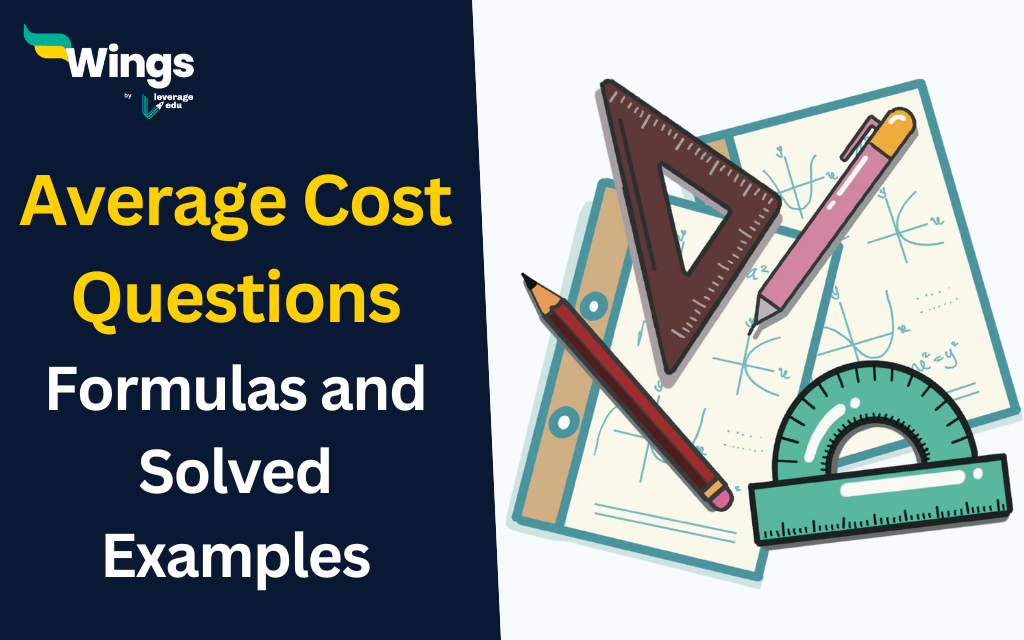These questions are part of the quantitative aptitude section and are often asked in entrance exams like banking, management, law and government exams like UPSC, CDS, NDA or AFCAT.
Contents
What is Average Cost?
The cost of a good or service is measured on an average basis. The average of these values will provide the average cost price when we have several products to sell or buy that are nearly equal in value. It helps shopkeepers in the buying and selling process.
The average cost is calculated as the sum of all product costs divided by the total number of products. We also use the word “average” in mathematics. The average of any given set of data is referred to as the “mean of the data.” In the context of business, where profit and loss are essential factors, it is asserted that the term “average” is appropriate.
Average Cost Formula
The formula for calculating average cost is given by:
Average cost = Total cost of the units/Number of units
The average cost deals with the summation of arithmetic cost divided by the number of the quantity or the number of items given.
The formula to calculate the average cost is given here. X = ∑(xi)/n
Where xi is the sum of all costs and n is the number of items.
Please Note
The symbol ‘∑’ (called sigma) is used to denote the summation.
Also Read: 50+ Questions of Verbal Classification Reasoning with Answers
How to Calculate the Average Cost?
We have already talked about how to figure out the average cost. Let us look at an example to figure out the average price.
Solution: Given that the cost of 11 bags is:
Rs. 500, Rs. 550, Rs. 450, Rs. 510, Rs. 520, Rs. 530, Rs. 540, Rs. 460, Rs. 470, Rs. 480, and Rs. 490.
So we know, according to the average cost formula;
Average = Sum of all the cost of bags/Total number of bags
A = (500+550+450+510+520+530+540+460+470+480+490)/11
A = 5500/11
A = 500
Therefore, Rs. 500 is the average cost of 11 bags.
Average Cost and Marginal Cost
We know that average cost is the ratio of total cost to the quantity of manufactured goods according to its definition. The total cost, which is also referred to as the unit cost, is the total cost plus the variable cost.
Hence,
Average cost = Total cost / Number of units = (Fixed cost + Variable cost) / Number of units
Marginal cost, on the other hand, is the expense incurred as a result of a change in total cost brought on by an increase in the number of products. Hence, it is an additional cost because of the manufacturing of extra products.
Businesses benefit from knowing whether it is advantageous to produce more units of a product or not. The marginal cost is given by;
MC = Change in cost/Change in quantity
Average Cost Questions – Solved
Ans. Cost of each ball Rs.40
In the given question,
Average Cost (AC) =?
Total Cost (TC) = 200
Quantity (N) =5
We know, AC = TC / N
Substituting the values in the above we get:
AC= 200/5
AC= 40
Therefore, the cost of each ball is Rs.40
Ans. 25 candies are present in the pack
In the given question,
Average Cost (AC) = 2
Total Cost (TC) = 50
Quantity(N) =?
We know, AC = TC / N
Substituting the values in the above we get:
2 = 50 /N
N = 25
Hence, 25 candies are present in the pack
Ans. Rs. 46 is the average cost of 5 chocolates.
In the given question,
The prices of chocolates are Rs. 50, Rs. 20, Rs. 55, Rs. 45, and Rs. 60.
N = 5
Formula: Average cost = Sum of all the prices of chocolates / Total no. of chocolates
AC= 50+20+55+45+60/5
AC = 230/5
AC= 46
Therefore, Rs. 46 is the average cost of 5 chocolates.
Ans. The fixed cost of each box is Rs. 260.
In the given question, we are provided with:
Variable cost (VC) = 240
Fixed cost (FC) =?
N = 6
Average total cost (ATC) = 300
Formula: ATC = VC + FC / N
Putting the value in the above formula, we get:
300 = 240+FC/6
1800-240 = FC
1560 = FC
Now, FC/6 = Fixed cost of each box
1560/6 = 260
Hence, the fixed cost of each box is Rs. 260.
Ans. The cost of all ten buckets is Rs. 1000.
In the given question, we are provided with,
N =10
ATC = 100
TC =?
Formula: ATC = TC/N
Substituting the values in the formula, we get,
100 = TC/10
TC = 1000
Hence, the cost of all ten buckets is Rs. 1000.
Engaging with these questions is instrumental in honing your analytical thinking, pattern recognition, and problem-solving skills. For more such study material on Indian Exams, check out Leverage Edu!


 One app for all your study abroad needs
One app for all your study abroad needs












 60,000+ students trusted us with their dreams. Take the first step today!
60,000+ students trusted us with their dreams. Take the first step today!